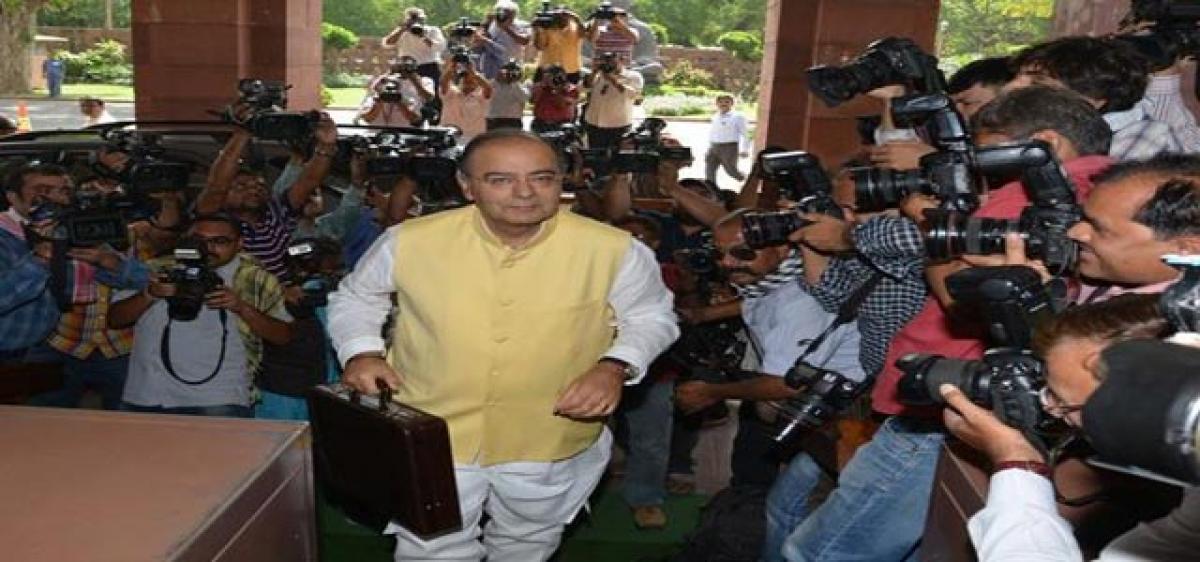Live
- Former Sri Lankan player and Victoria’s team coach Dulip Samaraweera banned from coaching for 20 years in Australia
- CM Revanth Reddy Calls for MSME Partnership to Achieve $1 Trillion Economy Goal
- Explosion of communication devices in Lebanon unacceptable: UN human rights chief
- YouTube Introduces AI Model Veo to Transform Shorts with 6-Second Clips
- Dhanush and Aishwarya Rajinikanth: Is a Reconciliation in the Works?
- Former MP Nandigam Suresh's Remand Extended for 14 Days in TDP Office Attack Case
- Illogical reply: Pawan Khera finds faults in Nadda's rejoinder to Kharge's letter
- Indian basmati industry’s sales to grow 4 pc to hit record Rs 70,000 cr in FY25
- Disappointed by Police Delay, Telangana Women’s Commission Steps In Jani Master Case
- Fadnavis orders probe into large scale fake PAN cards in Malad West
Just In

Today, amid all-pervasive gloom, Union Finance Minister Arun Jaitley gets down to his most challenging yet job of unveiling NDA government’s plans and measures to revitalise an economy hard hit by recession and demonetisation.
Today, amid all-pervasive gloom, Union Finance Minister Arun Jaitley gets down to his most challenging yet job of unveiling NDA government’s plans and measures to revitalise an economy hard hit by recession and demonetisation. Add to it the resurgence of drought. Reports about farm distress and industrial slump point to an unprecedented wave of enervation debilitating the socio-economic vitals of the nation. Sucking out about 86% or Rs 15.44 lakh crore worth of high-denomination notes has hit consumer spending, which accounts for about 60% of GDP.
Subdued consumer spending and surge in joblessness stare Jaitley right in the face. Besides pressure from own party and allies to turn the budget a sort of manifesto for the forthcoming five State polls, he has to contend with an opposition seething over budget timing and ready to do skullduggery. Their obstructiveness does not augur well for about 60 key bills pending, including the Goods and Services Tax (GST). The washout of winter session gives no room for the GST Bill passage until July and the FM has to explain how the government would pave for its implementation.
The FM will also have to justify advancing the budget timing as well as clubbing of railway and general budgets. Whether the railways, which has seen a series of accidents in recent past, will see predominance of safety and modernisation aspects or swanky projects like bullet trains will be keenly watched.
The current fiscal budget laid focus on rural economy, roadways and habitats. But the devastating note ban has dealt a body blow to rural economy and caused widespread job losses. Boosting industrial investments is thus an imperative, constrained as the government is to use its funds to revive uptick in the countryside. Another challenge Jaitley faces is on the global front.
Foreign investors wary of global slump will not come forward, unless the fiscal state of India and its incentives impress them. PM Modi wants to turn India into a global manufacturing destination and provide more thrust to home-grown start-ups to boost employment for the educated jobless. Thus, it is incumbent upon Jaitley to devise ways and means accordingly to make PM’s dream come true. If not, even domestic investors will not loosen their purse strings.
Besides private agencies, the CSO itself pegged GDP growth at its slowest pace in three years at 7.1%, excluding any impact of note ban. Still, a silver lining does appear in the hope of meeting 3.5% fiscal deficit target of GDP following income disclosure schemes and benami law and formalisation of a vast cash-only segment. An improvement is thus likely in tax-to-GDP ratio currently abysmal at 5.4%.
The government is already enthused by rise in tax collections after demonetisation. India needs to evolve into a fully tax-paying democracy to sustain the growth rates it has been registering of late. Chief Economic Advisors have always on the eve of Budget recommended policy prescriptions to set economy on right course.
The Economic Survey projected the growth rate for the current fiscal at 6.5 per cent. Agriculture may grow at 4.1% from 1.2% in 2015-16. But, industrial growth will fall to 5.2% from 7.4% in FY16. But it expects up to 50 basis points cut in growth rate due to demonetisation effect. Survey called for labour and tax policy relaxations to spur textile and leather sectors which are labour intensive.
As widely expected, the Survey suggested rollout of universal basic income (UBI) scheme i.e., direct money transfer to people's accounts. It claims even Mahatma Gandhi would have agreed with such a scheme. Since both Centre and States share social welfare funding, it requires a great amount of statesmanship and political acumen to win over the States to the Centre’s viewpoint. Given the bitter animosity between the government and the opposition, it is an arduous task. The specre of automation eating into job prospects may not suffice.
Be that as it may, India's low ratings on indices of health, education, nutrition, poverty, mortality etc., call for greater spend on social sectors. The President mentioned in his address to the Parliament the government resolve to take care of 'garib, dalit, pidit, shoshit, vanchit, kisan, shramik and yuva.' He felt financial inclusion was key to poverty alleviation. But, no less crucial is Gender Responsive Budgeting too.
In a nutshell, Jaitley will have to address issues such as tax simplication and rationalisation, boosting consumption, expanding reach of digital transactions, widening tax base, wooing investments, reviving rural economy, all the while keeping in view fiscal prudence. Finally, the FM also has to spell a long-term agenda while saving those in distress in the short-term. Indeed, given limited resources at his disposal, it is an onerous job of having to appease all sections in these hard times. He faces a dilemma between pragmatism and populism.
By Balaram Reddy K

© 2024 Hyderabad Media House Limited/The Hans India. All rights reserved. Powered by hocalwire.com







